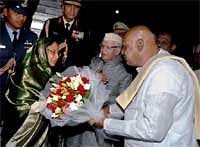
"Issues like terrorism, climate change, rapid communications systems and financial integration are some of the indicators of the global village concept.
Terrorists have woven a complex network across the world, posing a threat to innocent lives and to peace and stability of societies.
"Nabbing of consignments of weapons and drugs in one part of the globe can reveal a conspiracy of a much larger dimension.
For the media, it implies that even though it is covering local events, it must necessarily look at other linkages.
Needless to say, journalists have a stake in building a better and safer world," Patil said inaugurating the event.
Eminent Pakistani journalist Najam Sethi, until recently Editor-in-Chief of Friday Times and Daily Times, was presented the "Golden Pen of Freedom" award by the World Editors' Forum (WEF) for his fearless writings against extremist forces and the government.
Patil said similarly climate change has ramifications for individuals and for nations and media can play a crucial role in promoting behavioural patterns, consumption preferences and production models which are environment friendly.
Asking the media to play a proactive role, she said the paper and printing industries should look at using eco-friendly and energy efficient technologies so as to reduce its carbon footprint which can pave the way for a sustainable future.
Various sessions have been scheduled to discuss issues like "World Trends in the Newspaper Industry: An update of Print and Digital Developments" and "Future of Journalism Vs Future of the Newspaper, free press and shaping the future of the newspaper.
Over 900 participants from 87 countries are taking part in the three-day conference being held in India for the first time.